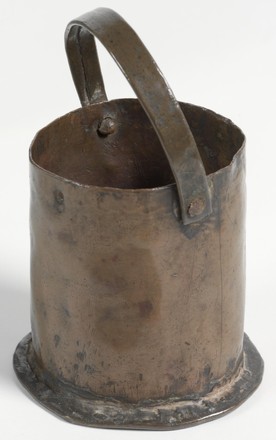Governor Macquarie's Breastplates
In 1815 Macquarie began
presenting selected Aboriginal men and women with brass breastplates. On 22
December 1816, Macquarie ordered Captain Gill, Acting Engineer to make ‘Six
Gorgets or Breastplates with Chains for Native Chiefs … according to the former
Size & Form’. Modelled on the gorgets worn by military officers, they were
engraved with the recipient's name, tribe and title, either 'chief', 'king' or
'queen'. Breastplates continued to be conferred until as late as 1930.
Cora Gooseberry's breastplate
Cora Gooseberry (d. 1852)
was a wife of Bungaree, who had received a breastplate naming him 'Chief of the
Broken Bay Tribe'. Governor Macquarie
dubbed them with these fictitious titles in an attempt to create Aboriginal
‘leaders’ with whom he could negotiate, illustrating how little Europeans
understood about the complex structures of Indigenous society.
The brass breastplate, engraved:
'Cora Gooseberry, Freeman Bungaree, Queen of Sydney & Botany' can be found in the State Library's collection. (Call No. R 251b)
David Scott Mitchell
Frederick
Wymark, of Angus & Robertson, Booksellers, regularly visited David Scott Mitchell when he was
bedridden at the end of his life. During one visit, Mitchell described this mug
to him and said that it had been given to Gooseberry to collect her allowance
of rum. Mitchell then asked Wymark to hand it down to him and he held it in
deep admiration and contemplation for about five minutes before passing it
back.
Cora Gooseberry
By http://www.sydneybarani.com.au/sites/cora-gooseberry/
Cora
Gooseberry was wife to King Bungaree and was an identity in Sydney for 20 years
after his death.
She
was known as ‘Queen of Sydney and Botany’ and ‘Queen of Sydney to South Head’
and was often seen wrapped in a government issued blanket, her head covered
with a scarf and a clay pipe in her mouth sitting with her family and other
Aboriginal people camped on the footpath outside the Cricketer’s Arms, a hotel
on the corner of Pitt and Market Streets in Sydney. She befriended Edward
Borton, the owner of the hotel who later owned the Sydney Arms Hotel in
Castlereagh Street where he allowed Cora Gooseberry to sleep at nights, and
where she was eventually found dead at the age of 75. Borton paid for a
gravestone and her burial in the Presbyterian section of the Devonshire Street
Cemetery (now covered by Central Railway).
At the
time she was thought to be the last of the Guringais to survive, but it later
became evident that the descendants of the Guringais had joined remnant
Aboriginal language groups to enable their survival. Her gravestone was
transferred to the Pioneers Cemetery at Botany. Her portraits by Charles Rodius
and William Henry Fernybough (made in 1834) and her breast plate are at the
Mitchell Library at the State Library of NSW.



 Back to list
Back to list